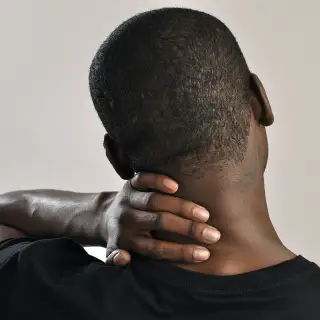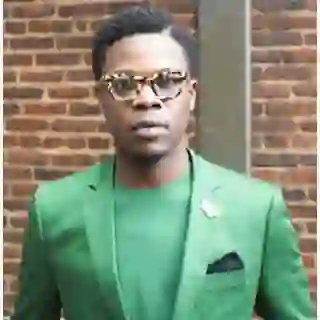
According to the Centers for Disease Control and Prevention (CDC), if current rates of new diagnoses continue, approximately 50% of black men who have sex with men (MSM) will test HIV positive during their lifetimes.
These numbers are startling. They are also a reminder of how much work still needs to be done in the black community with regards to the epidemic, as well as how the epidemic has shifted to a place where marginalized communities are infected at much higher rates than our white counterparts.
It is therefore important that black MSM who are actively on treatment remain visible and share our stories to fight against stigma and discrimination, as well as to give those who will later test positive some understanding of what it's like to be on treatment and thrive. Here are seven perspectives on testing positive and deciding to start treatment.

Kahlib Barton, 26 Years Old, Washington, D.C.
Starting HIV treatment was one of the most difficult decisions I've made, which ended up saving my life. It may seem like a no-brainer to some (do I want to live or not?), but in actuality, starting treatment means admitting to yourself that you are HIV positive, a reality that many people could never fathom.
After a three-year hesitation due to internalized and systemic stigma, I finally accessed the care I needed. This care granted me a newfound purpose: a commitment to survival. Today, I am proudly HIV positive with an undetectable viral load. I have only antiretroviral therapy to thank for that.
Photo credit: Rocky

Jahlove Serrano, 31 Years Old, New York, N.Y.
I started taking medication in June 2008 a few months after getting diagnosed with AIDS and Kaposi's sarcoma, aka KS. I had 20 T cells, and I lost a lot of weight. I thought I was going to die, but I didn't want to die from this disease.
My nurse practitioner informed me that if I started treatment, the cancer would go into remission. I would be able to build my immune system back up and get back control of my health.
Starting treatment was one of the best decisions I've made in my life. I told myself I wasn't going to be a statistic: another black gay man passing from AIDS-related complications. Since being on treatment, I've been adhering to my medication, building up my CD4 count, maintaining an undetectable viral load and keeping a healthy outlook on life.
Photo credit: Kamila Latala

Michael Tres Moore, 25 Years Old, Daytona, Fla.
Starting HIV treatment for me was challenging. I've always been weird about taking medicine of any kind, and I had to almost force myself to take the medicine. There were times when I didn't take it like I should, but I ended up getting on a schedule where I make sure I take my meds every day at dinner.
So, now, I'm undetectable and healthy, and it feels good to know that it isn't something I have to worry about. I'm happy, I'm healthy and, now, I can continue living the rest of my life happy and healthy.
Photo credit: Selfie by Michael Tres Moore

Andrew Braxton, 30 Years Old, Richmond, Va.
HIV is the best thing to ever happen to me. That statement may seem off-putting, but I'm so serious. Prior to HIV, I was a shady, superficial queen; I lacked humility and real substance. HIV has been the single humbling factor in my life. It caused me to have several seats and reexamine how I treat people and how I show myself to be friendly.
There is a silver lining in every storm and a lesson in every tribulation if you're open to it and look for it. With proper education, treatment for my HIV has given me peace of mind knowing that I'll probably outlive my negative counterparts. Early detection of diseases is an added benefit of getting blood work done every 90 days.
I live my life as Andrew: not as a person defeated and self-loathing but as a person excited about my future and boldly being me without limits.
Photo credit: Selfie by Andrew Braxton

Andre Norris-Darby, 31 Years Old, Newark, N.J.
After I first tested positive, I found myself surrounded by fear and stigma. This left me feeling hopeless and ready to give up on life. Learning more about new treatments and being proactive in my health made a major difference. I began to take back my life.
Today, it's as regular as taking a vitamin for me, and my life couldn't be better. I have a man who loves me, a family that supports me and friends who inspire me!
Photo credit: Selfie by Andre Norris-Darby

Dominique McGhee, 27 Years Old, Houston, Tex.
The decision to start treatment immediately once I found out about my status was the best decision I could have made, even though I was very nervous and unsure how my body would react to the medication.
Aside from irregular sleeping patterns and a week of worse-than-normal migraines, the biggest adjustment has been creating a routine that works for my not-so-routine daily life. I also had to remind myself of the importance of being mentally and emotionally healthy.
Photo credit: Chris Burns

Anthony Anderson, 22 Years Old, Washingon, D.C.
For young LGBTQ youth, I think starting treatment can be pretty scary but also a relief. When I first became positive in November 2015, I wasn't even sure if I would make it to the end of the year because I was so sick. I did not know there were medicines out there until I did some research. Once I found out about ART [antiretrovirals], I just wanted to get on them as soon as possible.
I think, historically, HIV has been stigmatized so much, that no one is talking about it. When I first thought about HIV, I honestly thought about a death sentence. After doing my research, it really put things into perspective. There are black gay HIV-positive men who came before us and left before us because no one cared to help them. Black gay men had to band together to fight this epidemic when nobody else did -- not even many political leaders.
For me, taking my meds is a form of resisting the stigma surrounding HIV and acknowledging the work that has been done to have ART. It is me actively taking agency over my own health and dispelling the rumors that you cannot have HIV and live a full, happy life.
Photo credit: Darrell Cottingham